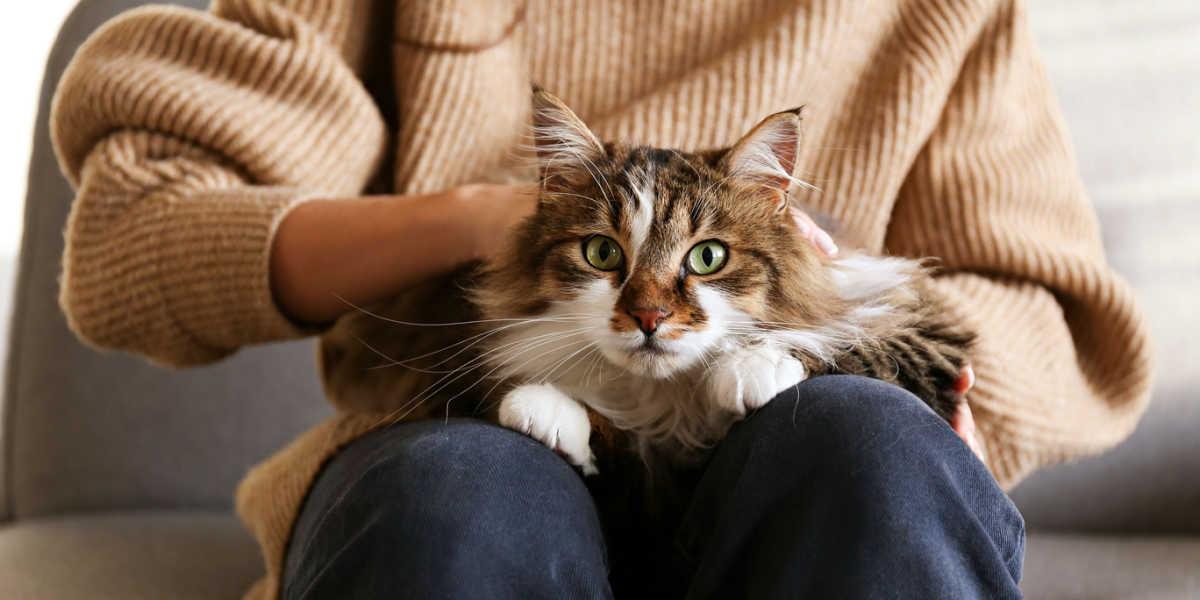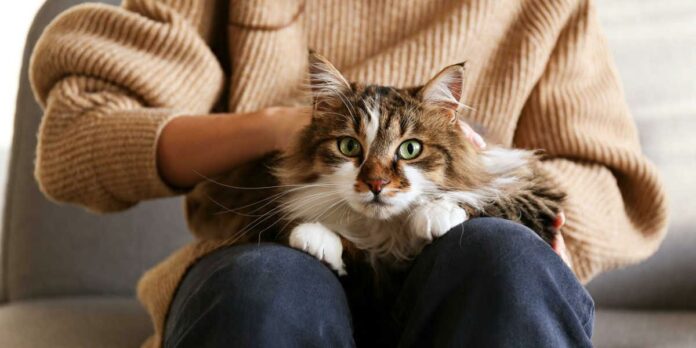
Have you ever been peed on by your cat? Perhaps they were on your lap and you discovered a suspicious wet patch on your clothes afterward, or maybe they jumped onto your lap and did a little bit of kneading and fidgeting before crouching down to pee on you?
You are viewing: Why Would A Cat Pee On You
It’s not very pleasant to be covered in cat urine, but before you get upset with your cat, be aware that this cat behavior can occur for many different reasons, and it could even be a sign of a health problem.
Why Do Cats Pee on Their Owners?
Cat owners might think that their cat is being spiteful when they pee on them, or that they are being a little obnoxious and don’t care about their owners. However, there are plenty of reasons why your cat might pass urine on you, and it’s unlikely to be because they don’t like you.
1. They Are Marking Their Territory
As well as scent glands on their body, cats also use their urine to mark their territory. If you’ve owned an unneutered male cat you’re more likely to have seen your cat spraying, but any cat might pass urine in unusual places if they are feeling insecure and want to be surrounded by their familiar smell while warning off other cats and predators.
If your cat feels that the bond they share with you is under threat, or that they are not getting the time with you that they crave, they might choose to mark you with their urine to show that you belong to them. Although it’s not pleasant, the sentiment behind it is quite sweet! You might notice this behavior if you’ve recently had a new baby or welcomed a new cat into the home.
Also Read: Best Laundry Detergents for Cat Urine
If you think your cat might be feeling a little needy, try spending more one-on-one time with them somewhere calm and quiet, away from any new additions to the family. The more quality time you spend with them, whether it’s playtime or cuddle time, the more they should feel reassured. If your cat is spraying and they aren’t neutered yet, getting them neutered could help reduce urine marking.
2. They Are Stressed
When cats are stressed, one of the most common signs is inappropriate urination. This could mean passing urine in the bathtub, on your laundry pile, on the carpet behind the television, or on your lap.
Wherever the location, this often causes stress among pet parents, too, which can make the original problem worse, so try to stay calm. If you have problems with your cat peeing in unusual places, check out Why Do Cats Pee and Poop in Shoes? and Top 5 Reasons Why Your Cat Keeps Peeing on Your Husband’s Things.
Stress in cats can be triggered by lots of different things, from a new cat in town to a new baby in the home. You can’t control everything in your cat’s environment, and keeping everything the same is impossible, being mindful of potential triggers can be helpful if your cat is sensitive to changes in routine.
However, if you notice that your cat has symptoms that might be stress related, try anti-anxiety or calming pheromone products, and take the advice of a veterinarian and qualified feline behaviorist.
3. They Are Afraid
Read more : Why Freeze Dried Candy
If your cat is scared, they might not feel safe going into the room with their litter box. If they are an outdoor cat and usually pass urine and feces outside, when something outside your home scares them they might choose to stay inside for a while.
This could leave their toilet habits a little out of whack. Ultimately, if your cat feels extremely scared and one of the only places your cat feels safe is curled up with you, it’s possible that they could end up peeing on you.
This type of fear in cats is usually short-lived, and your cat shouldn’t dwell on it in the long term. However, if your cat is continuing to pee in places where they shouldn’t, you should get an appointment at the veterinary clinic.
4. They Have Cystitis or a Urinary Tract Infection
If your cat has cystitis, where the bladder wall is inflamed, or a urinary tract infection, they might have the urge to pass urine suddenly. Similarly, the constant irritation of their bladder lining might cause them to strain a lot.
Therefore, it’s possible that they could have a one-off urinary accident while on your lap. Telltale signs of cystitis or a UTI are constant straining, passing small amounts of urine, or blood in the urine. If you’re not sure whether your cat is straining, read How to Tell if a Cat is Straining to Poop or Pee.
Cystitis signs in cats can be caused by stress, urinary crystals, infection, or, occasionally, a tumor or growth. Your veterinarian will be able to determine the likely cause of the signs with the help of a urine sample and might recommend antibiotics, anti-inflammatory medications, surgery, or calming and anti-anxiety products. More complicated feline stress cases might require the input of a veterinary behaviorist.
5. They Are in Pain
If your cat has an injury or is in pain, they might not feel like moving from where they are to get food, water, or pass urine and feces. Of course, some injuries and causes of pain are obvious, like a broken leg or a large wound. However, other causes of pain, like arthritis in older cats, will have more subtle signs.
Pain in cats might cause them not to move much and to go off their food. They’re also likely to withdraw and might be grumpier than normal. If you think that your cat might be in pain, whether or not you can identify the cause, it’s important to get them checked by a veterinarian.
6. They Have Lost Bladder Control
Some health conditions or traumatic injuries can cause incontinence (a lack of bladder control) in cats. If the nerves controlling your cat’s bladder and sphincter muscles are damaged or aren’t functioning properly, your cat might become incontinent or unable to pass urine.
An example of this is a tail-pull injury, where a cat’s tail gets trapped somewhere and partially separates from the vertebrae of the lower spine. The nerve damage caused by this type of injury can cause a flaccid, floppy tail that doesn’t move, and a bladder that can’t empty.
Some cats regain their bladder function as the injury heals; however, many remain unable to pass urine or leak urine as their bladder overflows.
If you suspect that your cat has lost control of their bladder, whether they’re unable to pass urine or they’re leaking urine, you must take them to a veterinarian.
7. They Are Unwell
If your cat feels poorly, they might not be able to get to their litter box or go outside and so they might pee on you. Some medical conditions, like diabetes mellitus, and kidney and liver disease cause an increase in thirst and urination, so your cat might also need to pee a lot more, making an accident more likely.
Read more : Why Did Hulu Log Me Out
If your cat is not acting like their usual self and has passed urine on you, it’s a good idea to get them an appointment with the vet, especially if they have other symptoms.
8. Their Litter Box Is Dirty
Cats hate having a dirty litter box, especially if it’s shared with another cat. If you have an indoor cat who usually uses a litter tray, but the tray is dirty or smelly, they’ll avoid using it and go somewhere else instead!
If your cat pees anywhere unexpected, it’s worth checking for any obvious reasons why they didn’t use the spot they normally would. A bit of detective work might just give you the solution!
To prevent inappropriate urination due to poor litter tray hygiene, a good rule of thumb for multi-cat households is to provide one cat litter box for each cat you own, plus one extra, and make sure they’re cleaned regularly.
Should You Worry if Your Cat or Kitten Is Peeing on You?
Below are some situations where you should be a little more concerned about your cat peeing on you. In these situations, it’s best to contact the vet right away.
1. There’s No Obvious Trigger
If none of the reasons listed above seem to explain why your cat is peeing on you, it’s a good idea to get the advice of a veterinarian or veterinary behaviorist.
2. There’s Blood in Their Urine
If there is blood in your cat’s pee, they might have cystitis, bladder stones, a urinary tract infection, or a tumor. Therefore, it’s a good idea to head to the veterinary clinic with a sample of your cat’s urine, so that the veterinarian can find and treat the problem.
3. They Have Been Straining
If your cat has been straining to pass urine, they might have cystitis, a urethral spasm, or a blocked urethra. It’s important to seek veterinary advice as soon as possible, especially if you haven’t seen them pass any urine recently.
4. They Can’t Move Their Tail
If your cat isn’t holding their tail in the position that they normally would, they can’t move it, or it feels cold to the touch, contact a veterinarian immediately. The veterinarian can check for signs of trauma and nerve damage.
5. They Aren’t Moving Around
If your cat isn’t moving from where they are laying, even to eat, drink, or pass urine and feces, there could be something more serious wrong.
6. They Have Other Symptoms or Signs of Injury
If your cat passes urine on you but is acting normal, it’s far less of a concern than if they have other symptoms of being injured or unwell. If something isn’t right then you should speak to your veterinarian.
Also Read: 11 Signs That You Need to Get Your Cat To the Emergency Room
Final Thoughts
It’s easy to get frustrated if your cat pees on you, especially if they regularly pee in places where they shouldn’t. Remember, though, inappropriate urination can be a sign of many different medical problems and behavioral problems, and a strong negative reaction from you could cause your cat even more stress and make the problem worse.
Source: https://t-tees.com
Category: WHY

